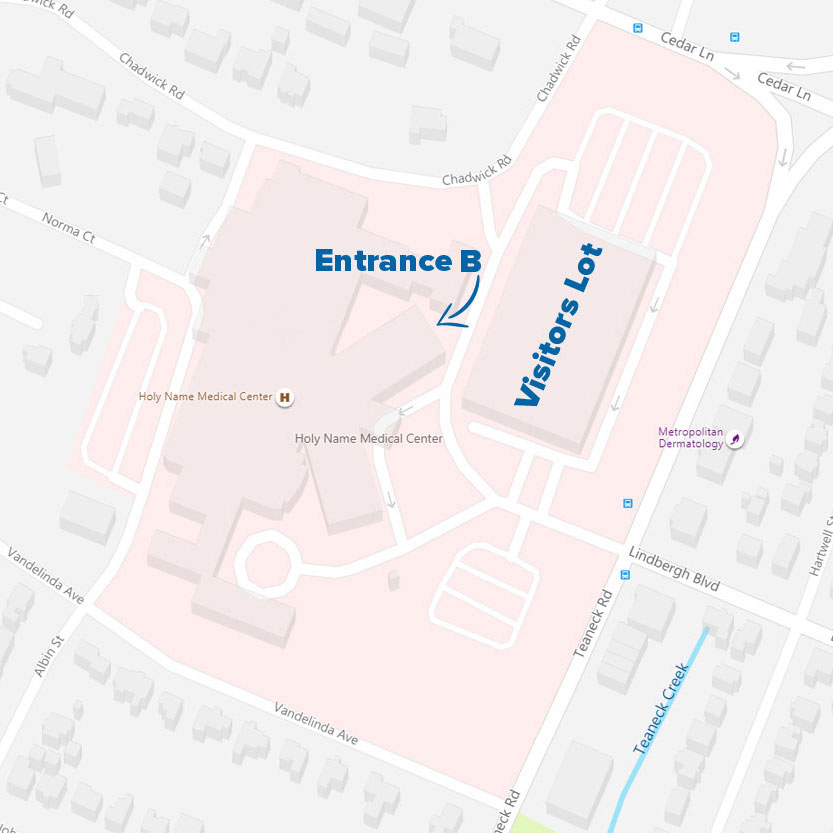Other Resources
Testing Basics
Please Note: At this time, Holy Name is only offering scheduled testing for those without symptoms and for those who need testing for travel, pre-procedure, etc. Anyone with cold/flu-like symptoms should consult with their primary care physician.
Testing Location
Holy Name is pleased to offer testing for non-symptomatic patients in the following location:
Holy Name Medical Center/Patient Services Center, Entrance B
718 Teaneck Road, Teaneck, NJ 07666.
Testing Appointment
COVID-19 testing for non-symptomatc patients is by appointment ONLY, please call (201) 833-7000 to register and schedule your appoitment.
When registering, please be prepared to share your insurance information.
Testing FAQs
Testing provides a current status only of the COVID-19 virus in your system. Testing is most appropriate when you either have symptoms or have had confirmed exposure to a known positive case.
At this time, Holy Name is only offering scheduled testing for those without symptoms and for those who need testing for travel, pre-procedure, etc. Anyone with cold/flu-like symptoms should consult with their primary care physician.
Holy Name Medical Center/Patient Services Center, Entrance B
718 Teaneck Road, Teaneck, NJ 07666.
On the date of your appointment:
- Park in the visitors lot. Bring your parking ticket with you for validation.
- Enter through Entrance B. See details on the medical center map above.
- If you can not keep your appointment, please call 201-833-7000, Option 3 to reschedule.

Holy Name's Outpatient Testing Center, Entrance B has available appointments:
Monday-Friday: 7:00 am to 4:30 pm
Saturdays & Sundays: CLOSED
No, a prescription is not required.
The PCR test is performed via a nasal swab. This test will detect if you are actively infected with the COVID-19 virus.
You will receive your results within 2 days of your test via e-mail notification or phone. You can also call our telemedicine providers at 201-541-5971.
PCR tests: detect the presence of the virus's genetic material using a technique called reverse transcriptase polymerase chain reaction, or RT-PCR. For this test, a sample may be collected through a nasal or throat swab, or a saliva sample may be used.
The accuracy of any diagnostic test depends on many factors, including whether the sample was collected properly, when during the course of illness the testing was done, and whether the sample was maintained in appropriate conditions while it was shipped to the laboratory. Generally speaking, PCR tests are highly accurate.
Antigen tests: detect specific proteins on the surface of the coronavirus. They are sometimes referred to as rapid diagnostic tests because it can take less than an hour to get the test results. Positive antigen test results are highly specific, meaning that if you test positive you are very likely to be infected. However, there is a higher chance of false negatives with antigen tests, which means that a negative result cannot definitively rule out an active infection. If you have a negative result on an antigen test, your doctor may order a PCR test to confirm the result.
Serologic test: Binding antibodies can be detected with blood tests starting about one week after the initial infection. If antibodies are found, it's extremely likely that the person has been infected with the COVID-19 coronavirus. The antibody level declines over time after an infection, sometimes to an undetectable level. A serologic test is a blood test that looks for antibodies created by your immune system. Your body takes at least five to 10 days after you have acquired the infection to develop antibodies to this virus. For this reason, serologic tests are not sensitive enough to accurately diagnose an active COVID-19 infection, even in people with symptoms.
If you've been exposed to someone who is positive, you should be tested. If you don't have any symptoms, it is recommended that you wait until after the fifth day of exposure to get tested for a reliable result.
Insurance is accepted and typically covers the costs of medically necessary tests. If you don't have insurance or your insurance does not cover all the costs, there are many federal and state sources of financial assistance that may be available to you, if you qualify. If you need assistance, please call our financial counseling department at 201-833-3157 or visit our Patient Guide to Insurance Counseling page.
If you choose to pay out-of-pocket, the self-pay rate is $25 per test.
For additional information, Contact the Call Center at:
201-833-7000
Monday - Friday 8:00 AM - 6:00 PM
Saturday 9:00 AM - 2:00 PM
Sunday 9:00 AM - 1:00 PM

